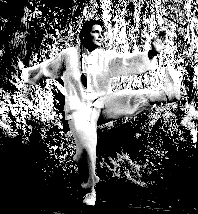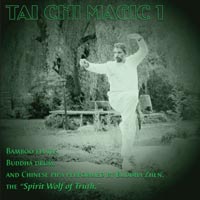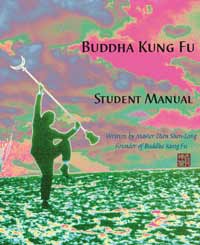| OUR FOUNDER | BOOKs CDs DVDs | BUDDHISM BASICS | CYBERTEMPLE | PODCASTS | SEMINARS | shaolinINTERACTIVE | DONATIONS |

Buddha Zhen
Buddhist Scientist,
American Philospher,
Poet,
Novelist,
Essayist,
Composer,
Musician,
Kung Fu Shifu,
Tai Chi Master,
Freemason
For more Buddhist self-help: |

Tai Chi Magic 1
by Buddha Zhen
8.88

Buddha Builder Book
Download now for $18.88
For more Buddhist self-help:
Visit Buddha Zhen's new website:
ACTzen.com

BUDDHISM BASICS page 4
Effort
Sometimes I think that capitalism has been a destructive force against perfection.
No, I'm not being a communist. However, in our search for lower prices and bargains, we have become comfortable with not purchasing or expecting the best of any product.
The price of perfection or the best product is thought to be beyond the reach of most people so they don't pay 'top dollar' for anything. Or, we are all so selfishly trying to cling to as much of our money as we can that we deprive ourselves of quality goods in an effort to spend as little as possible.
Sometimes the price of organically grown apples is more than regular apples. Even though we know there are pesticides on the regular apple, we are content to buy it because it's cheaper than the pure 'perfect' apple.
I use this metaphor to point out that effort and money are similar.
The effort required to be a little more patient, may not seem worth it.
The effort required to help a neighbor, may seem too expensive.
Buddhism, like all religions, seeks to help us put out more effort to be good or do good.
But this concept of effort is where all teachers, schools, religions, and governments have problems.
How do you teach someone to work harder for better grades in school?
How do you teach people to work harder to be better people?
How do you get citizens to try harder to obey the laws?
Unfortunately, most answers are of the dog training variety. We threaten with flunking and punishment and cages...
Buddhism does not employ so many threats. Actually, Buddhism has evolved a lot over 2,500 years and whenever it moved into a new country, it would absorb some of the cultural concepts of that country. This may have made it easier for some people to adjust to Buddhism, but it also polluted the religion with additional information.
Since most cultures and religions, that Buddhism absorbed, contained references to Hell and punishment, it may have seemed convenient to absorb some of these hellish concepts. Buddhism sprang from a primarily Hindu culture, so I think that some of even the Original Buddha's references to Hell were to merely communicate effectively in terms the people already knew.
As mentioned earlier, there have been a million Buddhas since the Original Buddha, Siddhartha Gautarma. Many of these later Buddhas had insights and revelations as valuable as the first sutras written.
Many of these ethnic traits and customs have added a great deal of color and flavor to Buddhism. Be careful not to become attached or dependent on these techniques of enlightenment. Although many of these concepts can aid enlightenment such as the mandalas of Tibet, or the sitting meditations of Japan, they can easily become limitations of enlightenment if they define boundaries and restrict conduct and control behavior.
I, personally, have been inspired by some of these later teachings, and firmly rejected some others. As for Hell, that's just another big stick to shake at the dog. Same with Karma. Threatening people that they will come back as a cockroach may work for a moment, but it's hardly the way for a person to be properly motivated.
A perfect life will still have difficulties and troubles. But a perfect life is a life that is free for you to decide each moment what you are going to do and how you are going to do it.
The more information you have, the better decisions you will make.
The better and easier you learn and adapt to life, the less difficult it will be.
The less difficult your life is, the more pleasant it is.
An unpleasant life is Hell.
This is the Hell that Buddhism teaches against.
So, Buddhism teaches that a perfect life is an ideal existence.
An ideal existence would be a perfect life.
Buddhism provides lots of suggestions for living a perfect life. Compassion is primary. The desire to love and appreciate and help other people should stem from your current lesson: to improve and gain control of your thoughts and actions.
Like raising a baby, you are motivated by the same love and concern to raise yourself. Your mind is a computer with the emotions of a baby. Be firm yet gentle with yourself, just like raising a baby.
As you gain control of your life and behavior, you will discover a new contentment.
So wonderful is this feeling of freedom and comfort that you will want to share it with other people. This desire to help others to be happy and content is compassion.
Compassion is then a measure of your own Buddhist development.
The more you discover - the more you will seek to share.
Buddha Zhen Shen-Lang
"Spirit Wolf of Truth"
Patriarch of Shaolin Zen
LET'S SEE WHAT YOU HAVE TO SHARE on Page 5
